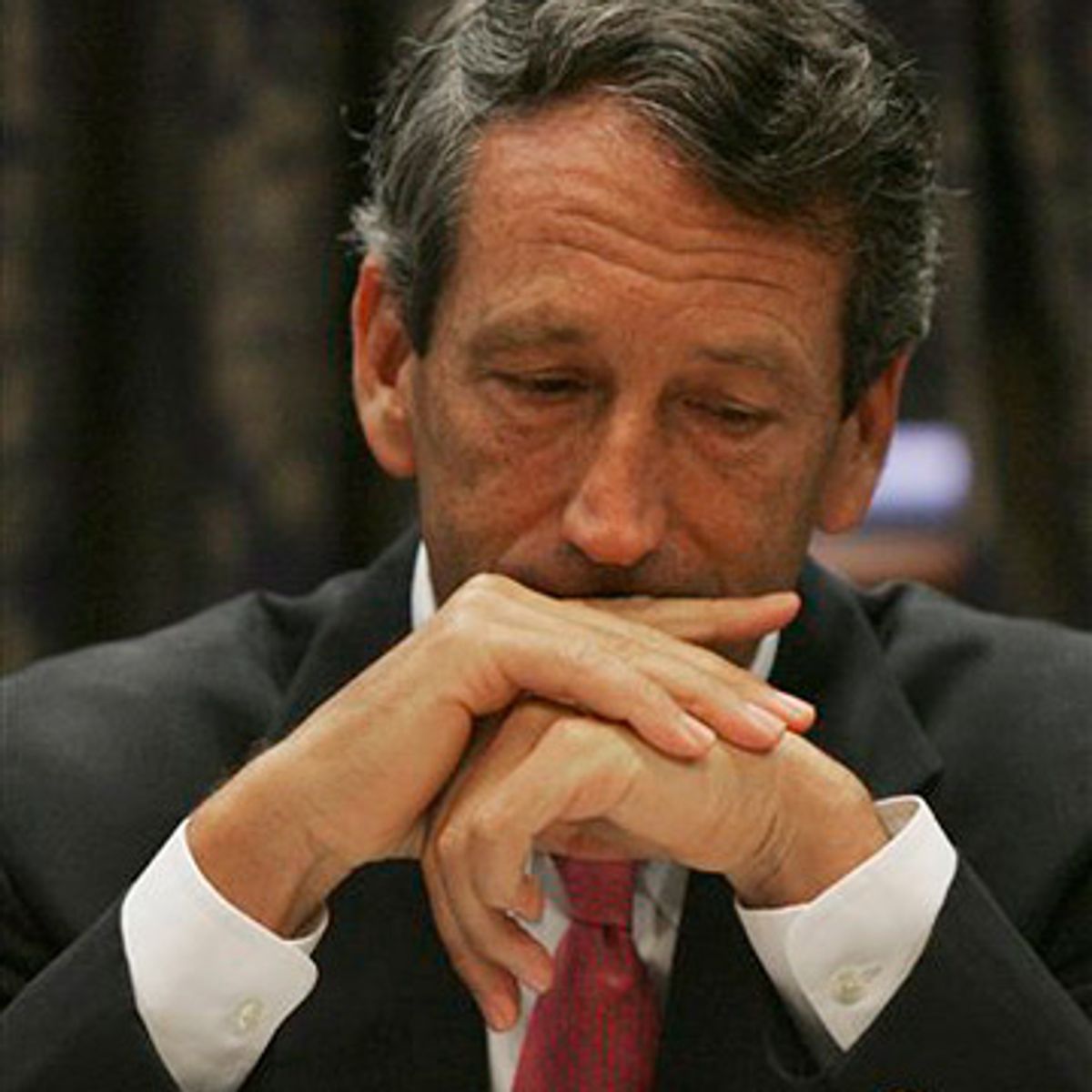The press conference on Wednesday, in which South Carolina Gov. Mark Sanford admitted to an affair, spoke of "God's laws" and tearily apologized to everyone he could think of, was largely treated as something of an odd affair. And it was -- but it was, in its way, a ritual completely familiar to anyone who follows U.S. politics. Really, he was just following in a long American tradition, one that can have some political benefits.
The narrative of the fallen man who sins, then repents and is forgiven and redeemed is an important one in American evangelism. And so the ritual Sanford participated in this week is one that's been practiced by politicians from both parties, not to mention a fair amount of prominent clergy.
The most famous example, of course, is Jimmy Swaggart's tearful plea for forgiveness, which he delivered from his pulpit in 1988 after he was caught with a prostitute. (A video on that particular apology is at the bottom of this post.) Sanford owes a deeper debt to Swaggart than he might realize, actually -- at one point in that legendary sermon, the preacher compared himself to Israel's King David, who committed adultery and then had his lover's husband killed. In a meeting with his Cabinet on Friday, Sanford also compared himself to David, saying the king "fell mightily, fell in very, very significant ways, but then picked up the pieces and built from there."
Swaggart, of course, wasn't the only preacher to go through the public apology -- Ted Haggard did it, too, and so did Jim Bakker. More than a few politicians have followed their example.
When he apologized to his family, and to the nation, for his affair with Monica Lewinsky, former President Bill Clinton didn't get as emotional as Swaggart had. But Clinton, who always knew exactly how to appeal to his fellow Southerners, especially religious ones, had the rest of the routine down cold. He even brought the Rev. Billy Graham to the White House for spiritual reinforcement after he'd confessed his infidelity.
Another Democrat, Kentucky Gov. Paul Patton, also took part in the great American tradition when his affair was exposed. "I did it. I deserve to suffer for it," Patton said. "Whatever kind of public humiliation that I have to take, I just have to take it ... I apologize to the people of Kentucky for my failure as a person ... I didn't sleep at all Wednesday night as I prayed for forgiveness from God and for guidance and strength."
Former Rep. Helen Chenoweth, R-Idaho, was less worried she might not get redemption after her affair. "I've asked for God's forgiveness," Chenoweth said in 1998, "and I've received it." Sen. David Vitter, R-La., was similarly sure of God's feelings about him after it was revealed he'd been on the client list of the D.C. Madam.
"This was a very serious sin in my past for which I am, of course, completely responsible," Vitter said in a statement. "Several years ago, I asked for and received forgiveness from God and my wife in confession and marriage counseling. Out of respect for my family, I will keep my discussion of the matter there -- with God and them. But I certainly offer my deep and sincere apologies to all I have disappointed and let down in any way.”
This ritual can even be applied to sins long in the past. Former House Speaker Newt Gingrich never showed much public remorse for his infidelity, but when he was thinking of running for president in 2008, he went directly to Focus on the Family founder James Dobson's radio show to admit that he'd had an affair and say, "I believe deeply that people fall short and that people have to recognize that they have to turn to God for forgiveness and to seek mercy ... I also believe that there are things in my own life that I have turned to God and have gotten on my knees and prayed about and sought God's forgiveness."
(Additional reporting by Gabriel Winant and Reid Pillifant.)

Shares